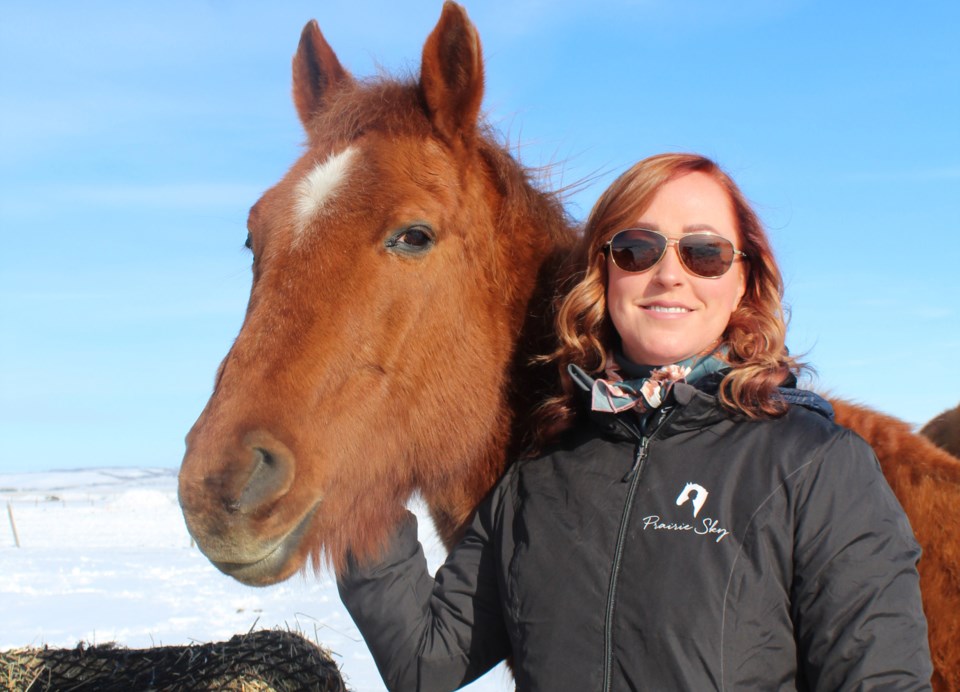Horses are a girl’s best friend.
It’s a slogan that rings true for Jessica van der Hoek – a first responder living with post traumatic stress disorder (PTSD) who has learned firsthand the benefits of equine assisted therapy – who is on a mission to help others like her.
Prairie Sky Equine Assisted Therapy is a registered charity operated by a board of directors since 2009 and located near Springbank. Van der Hoek and her team have been building successful equine assisted therapy programming, focusing on adults and children with special needs under the mantra “changing lives, one ride at a time.”
But it was her own battle with PTSD and mental health that inspired the 18-year-long paramedic to launch a new pilot program – one that focuses on equine assisted therapy for first responders, military personnel, and police/RCMP living with PTSD or other workplace-related mental health issues.
Beginning next month, the charity will be piloting small group sessions for six week intervals. Largely reliant on community donations, fundraising and grants, the aim is to keep the program at a minimal cost for its participants – each of whom will have access to an entire team of support.
The core team includes traumatologist and psychotherapist Mark Kolodziej and his wife, Kimberley, an equine assistance therapist, as well as van der Hoek and Gestalt equine coach Bonnie Bordonaro.
“I actually didn’t know I had PTSD. I just thought I was angry and exhausted,” van der Hoek said. “It wasn’t even considered a legitimate illness at that time, so my journey was really lonely.”
The year was 2011 when van der Hoek’s life as she knew it slid into “total ruin.” As her downward spiral into undiagnosed PTSD continued, she went through significant anxiety and depression, alcohol abuse, financial despair and an eventual divorce.
“Everything that could have happened, happened ... I had to restart from scratch,” she said about getting help and her journey of relapse from 2014 to 2017.
Van der Hoek said it wasn’t one singular event that turned everything upside down – a common misconception with PTSD – rather an accumulation of years of workplace events, of seeing the worst of life and scenarios difficult to imagine for average people but what becomes another day for first responders.
“It’s death by a thousand paper cuts,” she explained, adding that her path of self-discovery was a combination of traditional talk therapy, energy work and hypnosis and most notably for her, the positive impact of equine assisted therapy.
Equine Assisted Therapy
For nearly 10 years van der Hoek has witnessed countless individuals come through their doors – filled with teen angst or loneliness, mental health issues or deep sadness – only to leave rejuvenated, ready for a new lease on life.
“They look like completely different people when they leave – the light in their eyes is on.”
Horses are of course majestic not magical; however, a little science goes a long way to explain the impact these steeds have upon humans.
“There’s a physiological process that happens in the body when we’re around horses.”
Van der Hoek explained that when under stress, the brain secretes high levels of cortisol, which leaves an individual in a constant state of “flight or fight.” For first responders, they tend to stay in this zone for even longer periods of time, often unknowingly, which can lead to PTSD or other forms of trauma.
When in the presence of horses, the brain begins to secrete “happy hormones” such as dopamine and oxytocin. Horses have a larger electromagnetic current than humans and once a person steps into its field, blood pressure drops. The brain begins to develop new pathways of positive association, resulting in a starvation of the trauma pathways.
Mark further explained that in 23 years of working in counselling for Calgary Police Services and Calgary Fire he has seen measurable results from equine assisted therapy.
“I’d like to see these first responders who have helped us get the help they need,” said Mark, adding that those on the front lines see some “pretty terrible things” every day.
“Sometimes no other therapy has worked on them,” he added. “While it’s not for everyone, I’ve seen a significant impact on a significant number of people.”
“I would like to see this program so effective that we’re going to be making a significant difference in peoples’ lives,” he said, adding that he would love to see eventual expansion beyond Alberta’s borders, as there are unique aspects to their program.
To learn more, visit pseat.ca or call 403-966-4431.




